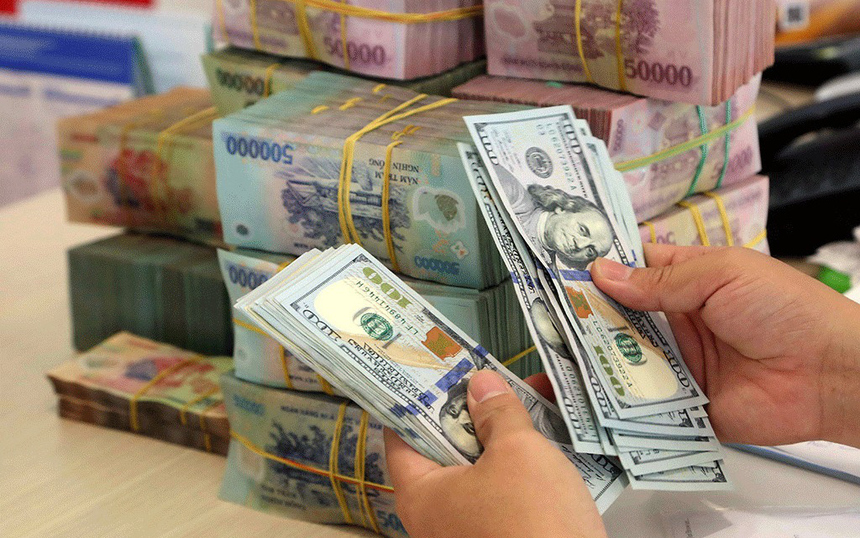How to deal with upward pressure on USD/VND rate
Because of the Trump administration's tariff measures, the USD is likely to strengthen, putting a lot of pressure on the USD/VND exchange rate.

Businesses must diversify their import-export markets in the situation and utilize derivatives to protect themselves from exchange rate risks.
USD is too strong
Following Donald Trump's victory in the presidential election, the USD saw a recovery on the international market. As we moved into 2025 and U.S. President Donald Trump imposed tariffs on China, the greenback's upward trend persisted. The USD index even got close to 110 points at one time, which was the highest level in the previous two years. The USD index is still trading at about 107.5 points right now. It is still very high even if it has somewhat dropped from the start of this year.
Many experts believe that President Donald Trump's tariff measures and the expulsion of illegal immigrants are the primary causes of the USD's increase. These factors could force inflation to spike back up and prevent the Fed from continuing its interest rate decreases.
All of Trump's proposals, both before and after his election victory, focused on placing extremely high import taxes on commodities from China and the top exporting nations to the United States, according to analysis by financial expert Dr. Nguyen Tri Hieu. But those penalties will fall primarily on the American people, creating a situation where people are "hitting oneself with one's own stick" and possibly driving inflation to extremely high levels.
The president of the United States is also anticipated to deport millions of undocumented workers. The United States may have a labor shortage as a result, which would raise labor expenses and cause inflation. Furthermore, a larger budget deficit may result from the proposed tax cuts for the rich in the United States. The U.S. government will issue high-interest government bonds in order to balance the budget deficit. "All of those factors could force the FED to raise rates, essentially to control inflation," said Mr. Hieu.
Indeed, on February 11, 2025, FED Chairman Jerome Powell testified before the U.S. Congress that the Fed will not rush rate cuts because the U.S. economy is still very robust and inflation is still far higher than the Fed's target of 2%.
Risk management strategy
The USD/VND exchange rate has been under a lot of pressure due to the strength of the USD. As a result, the VND continued to experience severe pressure in the early days of 2025 after weakening by about 5% in 2024, when the USD index peaked for the second time in two years.
Furthermore, the supply and demand for foreign currency domestically also exert pressure on the USD/VND exchange rate at any given time, according to numerous experts. Exchange rate management will be advantageous if exports and foreign direct investment both improve and the supply of foreign currency rises. The currency rate will be under ppressure. Nevertheless, if exports encounter challenges or if demand for imports rises.
The VND would continue to weaken against the USD in 2025, according to Mr. Suan Teck Kin, Director of the Global Markets and Economic Research Division at UOB Bank Singapore: The USD/VND exchange rate will be 25,800 in Q1 2025, 26,000 in Q2 2025, 26,200 in Q3 2025, and 26,000 in Q4 2025.
Dr. Nguyen Tri Hieu asserts that in order to reduce exchange rate pressure, Vietnam must preserve the stability of the financial system, limit inflation, and guarantee macroeconomic stability. In order to accurately reflect the supply and demand of foreign currency in the market, it is very important to regulate the exchange rate flexibly, enabling it to vary within a specific range while bolstering foreign exchange reserves to intervene in the foreign exchange market when needed.
The State Bank of Vietnam's (SBV) deputy governor, Mr. Dao Minh Tu, said that the SBV will keep a careful eye on market developments in order to manage monetary policy proactively, flexibly, promptly, and effectively. It will also work closely and harmoniously with fiscal policy to prioritize economic growth, encourage business and production, contribute to macroeconomic stability, and control inflation. "The SBV will closely monitor market conditions to manage the USD/VND rate flexibly and appropriately, coordinating seamlessly with monetary policy to help control inflation and stabilize the macroeconomy," Tu stated.
In light of recent events, experts advise companies to diversify their import-export markets, be adaptable in their business plans, and borrow in partner currencies to lessen their reliance on the US dollar.
Additionally, companies must employ derivatives to protect themselves against exchange rate risk. "Currently, banks are providing quite a few derivatives to help businesses hedge against exchange rate risks, such as futures contracts, options contracts, etc.," advised an expert.








